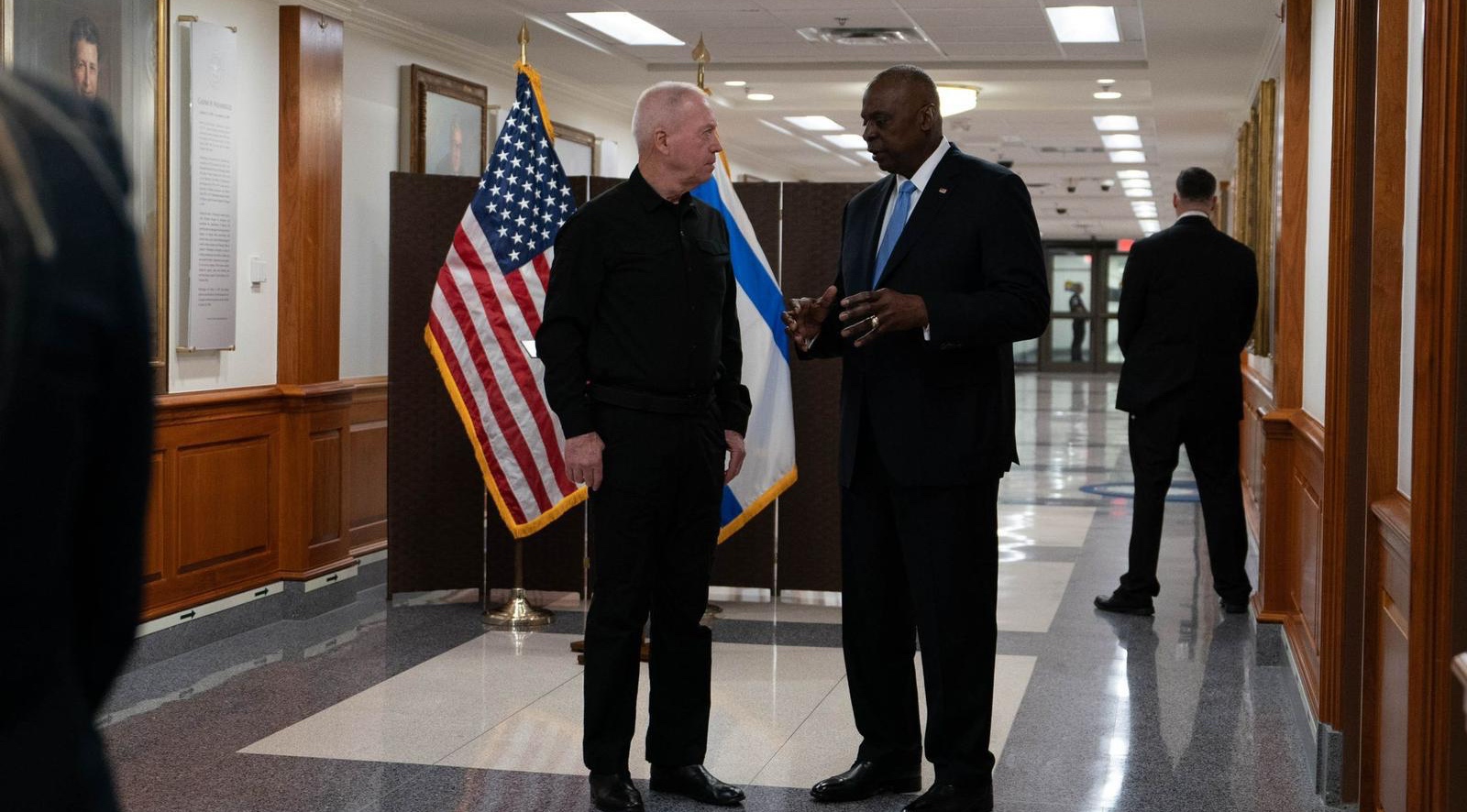WASHINGTON — Israeli Defense Minister Yoav Gallant spent a lot of time on his Washington tour this week in closed rooms, discussing sensitive and urgent issues with senior officials.
When it comes to U.S.-Israel relations, he said, that’s exactly as it should be.
“Any obstacles that exist are discussed in closed rooms,” Gallant said on Tuesday evening at a press briefing. “I think that this is the way to work between friends and allies.”
Gallant’s statement drew an implicit contrast with his boss, Prime Minister Benjamin Netanyahu, who is fond of major stages and who has made waves recently with public statements castigating the Biden administration for slow-walking weapons shipments. Biden officials say they don’t know what he’s talking about. Netanyahu has described that pushback as “personal attacks.”
The defense minister did not name Netanyahu, but in response to a question, he did confirm that that’s who he was talking about. “I believe that allies must do everything to solve issues in closed rooms,” he repeated.
Gallant’s alarm at Netanyahu’s conduct reflects increasing concern in Israel’s security establishment about the rift between the embattled country and its closest ally, on which it relies for military aid and diplomatic cover.
“Our ties with the United States are the second most important element for Israel’s security, after the IDF,” Gallant said. “We need American diplomatic and political support, power projection, supply of munition and more.”
(Access to the meeting with Gallant was made conditional on agreeing not to report its contents until after the Israeli government cleared quotes for publication, which happened Wednesday night.)
In the face of criticism, Netanyahu doubled down on his public approach, which he called a matter of national security.
“When the disputes are not resolved for weeks behind closed doors, the prime minister of Israel needs to speak openly in order to bring what the soldiers need, and that’s what has happened this time too,” he said, according to Haaretz.
Gallant had a busy schedule in Washington. He met with CIA Director William Burns, Secretary of State Antony Blinken, Defense Secretary Lloyd Austin and National Security Adviser Jake Sullivan. He and White House officials both said they made progress in resolving what they portrayed as misunderstandings over the weapons transfers.
“I think where there was some misunderstanding, those were clarified about where certain cases might be in the course of our process, which can be complex,” said a senior administration official briefing reporters after the meeting with Sullivan. “And I thought from I the meetings I was in with respect to this, and the readouts I got from some of the others, there was real progress in a mutual understanding of where things stand, of prioritization of certain cases over others so that we can make sure we are moving thing in a way that can be of assistance to the Israelis.”
Gallant agreed. “During the meetings we made significant progress, obstacles were removed, and bottlenecks were addressed, in order to advance a variety of issues and more specifically the topic of force build-up and supply of munition,” he said.
Gallant, while a member of Netanyahu’s Likud Party, has clashed with the prime minister repeatedly over his leadership style. Polls show he has higher favorability ratings than Netanyahu, whose popularity in Israel took a tremendous hit after Hamas’ Oct. 7 attack.
But his anxiety over Netanyahu’s willingness to duke it out with Biden reflects the longtime outlook of the military establishment that shaped Gallant, a retired major general who for years was in charge of the border with Gaza and was at one point a leading candidate to head the IDF.
In recent decades, during Netanyahu’s long tenure at Israel’s helm, defense ministers such as Ehud Barak and Moshe Yaalon were called on to play a reassuring role amid tensions with the administration. In May, preceding the current spat, security officials in Israel warned that tensions with Biden could harm the war effort.
(There are concerns among other Netanyahu critics that the prime minister’s upcoming speech to Congress next month will exacerbate the divide between him and President Joe Biden. An array of prominent Israelis on Wednesday urged Congress in a New York Times op-ed to rescind the invitation, which they wrote “will further distance any deal to secure the release of the hostages, including several U.S. citizens.” But the defense minister has not echoed that call and the authors of the op-ed are all associated with the left — hardly his ideological allies.)
Gaza and weapons were far from the only items on Gallant’s agenda in D.C. He also discussed worsening clashes between Israel and Hezbollah on the Lebanon border, and the dangers that the northern front could explode into a war.
“We do not want war, but Hezbollah is playing a dangerous game and we will not tolerate attacks on our citizens, and tens of thousands of Israelis displaced from their homes,” he told reporters.
Iran, which sponsors Hezbollah and Hamas and which is believed to be closer than ever to a nuclear weapon, was also raised in his meetings, he said. He mentioned that a U.S.-led coalition helped Israel repel a massive Iranian missile attack in April.
“Now is the time to stop Iran from gaining a nuclear weapon,” he said. “Time is running out.”
JTA has documented Jewish history in real-time for over a century. Keep our journalism strong by joining us in supporting independent, award-winning reporting.






